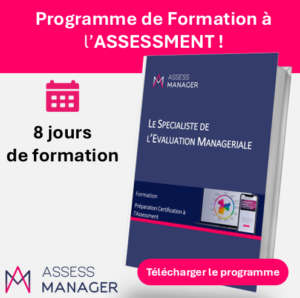What is Assessment?
When should an assessment be used?
Assessment becomes more democratic
Assessment is an in-depth development, mainly for managers or experts with high added value. The assessment concerns managerial skills, the ability to disseminate the corporate culture, and other more specific points that vary according to the context.
Within this range of assessments, the client may ask for more specific aspects such as:
- The way in which they understand and analyse a subject and their ability to take measured decisions;
- The way in which you support change in the context of future structural developments that will have an impact on your teams;
- The relationship with the hierarchy and the way of being a force of proposal while being respectful of decisions, even unpopular ones
These are non-exhaustive examples, and we adapt the assessment according to the brief given before the Assessment. The aim is to validate the match between the needs of a position and its environment and a candidate, whether internal or in the recruitment phase.
Assessment is no longer an elitist solution, its cost is becoming more accessible and it is increasingly used to validate, in particular and in the majority of cases, internal job changes and preparation for taking up a new position. The Belgians have been ahead of us in this area, where assessment has been democratised for a long time. Let’s follow the guide!

What are the 4 reasons for using Assessment?
Assessment is a service that helps companies to make the right choices and to reconcile sometimes divergent opinions. Assessment provides objectivity and recommendations for securing career paths.
- Recruitment
In-depth evaluation of a potential employee’s skills. Assessment of a single candidate, or a short list of candidates. Assessments as part of the recruitment process help to secure a decision, and also identify the support plan after onboarding, particularly for managers and executives.
- Internal mobility
Assessment prior to internal mobility. Often, several candidates apply, but only one gets the job. How can we bring neutrality to the approach to reassure applicants, and keep them motivated if they are not selected, while giving them avenues for improvement?
Assessment can also be used to use factual elements to reconcile differences in assessment by the company’s committee, in order to reach a final decision
- Detecting talent
As part of a GPEC approach, companies sometimes want to identify tomorrow’s talent and offer them a specific career path. Assessment can be used to arbitrate in the event of disagreement, and can also detect talent that has not been identified by managers or HR.
- Problem solving
Sometimes a manager has problems with his or her job and the company. The Assessment helps to clarify the person’s potential, their current level and possible ways of supporting them if necessary. Assessment can also open the door to professional mobility if the position seems unsuitable, and encourage the employee to become aware of the situation in order to get him or her moving.

ASSESSMENT Offer : Assess a candidate’s skills using a range of psychometric tools and a variety of situational exercises
Examples of internal mobility – the Assessment Centre for Expert profiles
- The welding team leader is retiring. As Patrick is the best welder, the company quite naturally wants to offer him the position of team leader. Is he ready for management? How can we help him prepare for this role, if the decision is confirmed?
- The sales manager is leaving the company, and a replacement needs to be found quickly. Who is the right sales person to replace him or her? Who has good sales results?
These arecommon and legitimate reflexes, as these are the people who will have the most influence with their colleagues. They are recognised for their expertise or results and will be easily accepted for the job. Experience shows that this is not always the best choice.
Expertise is no guarantee of management skills or potential. We invite you to check this point before making your decision with Assessments.

To go further with Assess Manager


